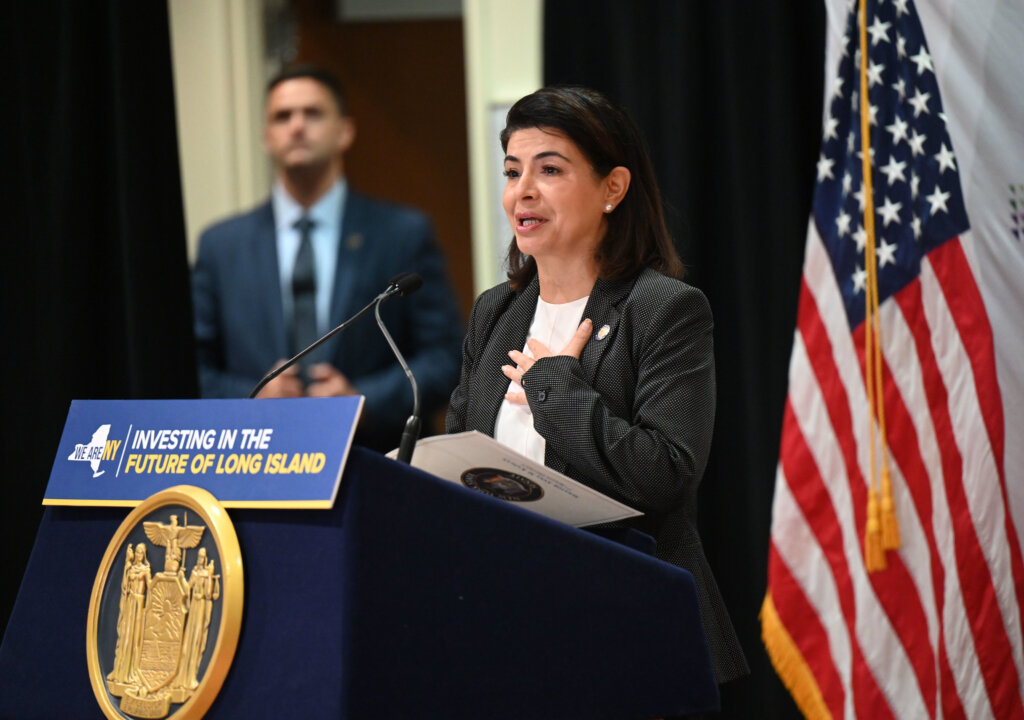Santos is out — who will Nassau County next send to Congress?
Former Rep. Tom Suozzi, with deep Jewish ties, emerges as favorite to replace ousted congressman George Santos

Ousted Rep. George Santos (R-N.Y.) on Nov. 30. Photo by Drew Angerer/Getty Images
Less than a week after the House expelled George Santos for lies and other ethical transgressions, the scramble is on to fill his empty Nassau County House seat. Voters will do that in a special election in February. By the end of the week the Democratic and Republican parties will reveal their candidates.
Both parties have a shot at the New York swing district, which a Democrat comfortably won in 2020, as did President Joe Biden, but which went to Santos, a Republican, in 2022. It remains a toss-up, according to the Cook Political Report. Whoever wins the February contest will hold the seat for less than a year unless they can win again in the regular election in November. Would-be congresspersons are making their final pitches against the backdrop of the Israel-Hamas war and rising antisemitism.
There are frontrunners.
Democrats are poised to nominate former Rep. Tom Suozzi, who retired from Congress in 2020 to run for governor. He has already held the seat, which includes the western portion of Long Island and parts of Queens. But former Jewish state senator Anna Kaplan, who fled persecution in Iran and announced a run for the seat earlier, is still hoping to get the nod. On the Republican side, Mazi Melesa Pilip, an Ethiopian-born Orthodox Jewish county legislator and a staunch supporter of Israel, is on the shortlist.
Jewish voters in New York’s 3rd Congressional District — estimated to be 13% of the electorate — are likely to play a role in electing the next representative. A poll released last year showed that only 9% voted for Santos, who falsely claimed to be a “proud American Jew.” His Jewish Democratic rival, Robert Zimmerman, received 72% of the Jewish vote. Zimmerman said if Suozzi ran for the seat, he would not.
Who’s running?
Suozzi, who sources familiar with the process said is likely to be announced the nominee by Friday, has deep ties with the Jewish community. He served as county executive before succeeding former Congressman Steve Israel, who is Jewish, following his retirement in 2016. Suozzi was vice-chair of the Problem Solver’s Caucus, evenly split between Democrats and Republicans, and his first House floor speech was in support of Israel. He often uses Yiddish and Hebrew terms when engaging with Jews.

In an interview during his run for governor in 2022, Suozzi described himself as a mensch and said he was the “most reliable non-Jewish Democrat” on Israel and issues of particular importance to Jews.
Republicans, mindful of how poorly Santos was vetted before his race, are working to settle quickly on a candidate free of baggage.
But two of the Republicans under consideration are already entangled in some controversy.
Politico reported Wednesday that Pilip is still a registered Democrat despite being elected twice as a Republican. A former Israeli paratrooper, she unseated a four-term Democrat in a red tide that swept over Long Island in 2021 and was considered a favorite to run for the seat.
Another top contender, Mike Sapraicone, a retired New York Police Department detective, donated more than $39,000 to Suozzi and faced allegations of pressuring a false confession and disregarding exonerating evidence that resulted in the wrongful imprisonment of a man for two decades.
Kaplan makes her case
Kaplan, in an interview Tuesday, said she is determined not to be overlooked for the Democratic nomination. In recent days she has gone on the offensive in a series of tweets against Suozzi over abortion. And she said she reminded party officials in her screening interview on Friday that she had flipped her State Senate seat from red to blue when she first won in 2018. She also noted that her announcement video garnered over 1.6 million views and that she has amassed $1.2 million in her campaign war chest, from some 26,000 individual donors.

“I think I’m the best candidate,” Kaplan said. “I am cautiously optimistic that I am the nominee.”
She has pushed her personal history hard in her quest for the nomination, contrasting it to Santos’ fabricated Jewish past — he lied about his grandparents fleeing anti-Jewish persecution during World War II.
Born Anna Monahemi in the city of Tabriz, Iran, Kaplan was sent to the U.S. by her parents for her safety at the age of 13 during the Iranian Revolution. As part of an international initiative to safeguard Iranian Jewish children, she first settled in Brooklyn and then lived with a foster family in Chicago, where she learned English. Eventually, the U.S. government granted her political asylum and she moved to Great Neck, Long Island.
She said she would “bring a very unique presence in the House” to counter growing criticism of Israel and to combat rising antisemitism.
Her Middle Eastern heritage, she said, “dispels the misguided belief that Israel’s conflict with the Arab world is rooted in racism.”
Kaplan said she will accept her party’s decision for the special election, and, depending on its outcome, evaluate a run in the regular election in November 2024.
Suozzi declined to comment for this story.





















